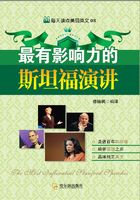
第14章 走出去并使之成为可能(1)
Get out and Make Things Happen
I have three short stories, one historical reflection, one piece of advice and one translation.
The first story is about my very own favorite professor. And for that reason, it‘s autobiographical. When I was about your age, and graduation was approaching, I decided it was time to venture off campus and have a look around. And I discovered something that I want to share with you beforeit’s too late: College was the easy part. Now it gets hard. I know college has seemed hard-all those papers and exams and labs and problem sets. But three things have made it easy: freedom, forgiveness and indulgence. All three of those are about to disappear from your lives.
Think about the freedom part. Consider what you‘re going to miss: no more mid day naps, no more spring breaks, no more three-week Christmas holidays, no more three month summer vacations, no more skipping classes when you feel like it, no more choosing to study only what you want, no more avoiding all classes before 11 a.m. -and most painful of all, no more daytime TV.
As for the forgiveness: Well, outside the bosom of your family, you will never again be in such a forgiving environment as the one that has nurtured you here at Stanford. If you oversleep and miss class, hey, just get somebody else’s notes. Miss an exam question, just ace the next one. Paper no good? Ask to rewrite it. Course too tough? Take it credit. Flunk the course-or, worse, get a B-minus-just repeat it. Not prepared for the final exam? Get a doctor‘s excuse (or arrange to have a grandparent die) and take it later.
But out there beyond the Palm Tree Curtain-well, suffice it to say it’s a jungle out there. Oversleep and lose your job. Turn in the wrong results and get sued. And just try to see a doctor.
And as for indulgence, let me tell you something: For four years my colleagues and I have been paid to read your papers, to answer your questions, to listen to your comments, recommend you for grants and jobs and internships.
No one will ever be obligated to do this again. If your writing is not clear, original and compelling, nobody will read it. If your comments are not trenchant and factual, nobody will listen. Out there in that jungle called the real world, nobody cares, nobody listens, nobody notices-unless you‘re reallygood.
So, I figured all this out about 40 years ago, when I came back from thatexpedition off campus, and I’ve never left it again. I know I‘m sharing this with you at the eleventh hour, but I apologize for not being in touch sooner.
Now for a bit of historical reflection. It’s customary on occasions like this for speakers to try to reach across the generational divide-to attempt to bridge the cultural chasm that leaves me unable to program a VCR and leads you to labor under the assumption that Paul Newman has always made salad dressing and that Michael Jackson has always been white. Commencement speakers by the thousands struggle every springtime to find some intergenerational connection-some element of comparison or contrast that links the historical moment in which their own graduation was set to the historical circumstances that will now face the graduates they face-usually by way of suggesting that back in the day the winters were colder, the snowdrifts higher, the gruel thinner, the hardships harder, and by comparison your lives are cushy and privileged and the road has been paved for you with the blood, sweat and tears of your eternally toiling forebears, and you‘d darn well better-well, you get the picture.
But the fact is that my generation had the unexampled good fortune of being given much of our allotted time on this Earth during what the novelist Philip Roth has called“the greatest moment of collective inebriation in American history.”He referred to that giddy, prosperous, self-confident post-World War II era when anything seemed possible, and lots of previously unimaginable things were indeed possible-like a college education for this grandson of a railroad section boss and a coal miner.
So I want to go back to a moment before both my time and yours-the World War II era-by way of suggesting something that’s new and more than a little troubling under history‘s sun in this year of grace 2005.
From the time of the ancient Greeks through the American Revolutionary War and well down into the 20th century, the obligation to bear arms and the privileges of citizenship were intimately linked. From Aristotle’s Athens to Machiavelli‘s Florence and Rembrandt’s Amsterdam and John Adams‘Boston and beyond, to be a full citizen was to stand ready to shoulder arms. It’s why the founders of this country were so concerned with militias and so worried about standing armies, about which Samuel Adams said,“A standing army, however necessary it may be at some times, is always dangerous to the liberties of the people.”It‘s why Franklin Roosevelt could boast about those GIs as“the greatest generation”who landed in Normandy on D Day in 1944. And he said,“Our sons, pride of the nation. They yearn but for the end of battle, for their return to the haven of home.”It’s why African Americans were so eager to serve in World Wars I and II, to secure their full claim to citizenship rights. For more than two millennia, the tradition of the citizen soldier has served the indispensable purposes of sustaining civic engagement, protecting individual liberty-and guaranteeing political accountability.
None of you is liable to the obligation of service, and very, very few of you will ever taste battle. In another era, exemption from that obligation would have disqualified you from full citizenship. Maybe it will yet.